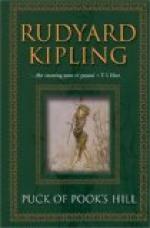‘And the man wasn’t really dead?’ said Una.
‘Not a bit. All as much pretence as a dolls’ tea-party. Then they brought out a splendid white horse, and the priest cut some hair from its mane and tail and burned it on the altar, shouting, “A sacrifice!” That counted the same as if a man and a horse had been killed. I saw poor Weland’s face through the smoke, and I couldn’t help laughing. He looked so disgusted and so hungry, and all he had to satisfy himself was a horrid smell of burning hair. Just a dolls’ tea-party!
’I judged it better not to say anything then (’twouldn’t have been fair), and the next time I came to Andover, a few hundred years later, Weland and his temple were gone, and there was a Christian bishop in a church there. None of the People of the Hills could tell me anything about him, and I supposed that he had left England.’ Puck turned; lay on the other elbow, and thought for a long time.
‘Let’s see,’ he said at last. ’It must have been some few years later—a year or two before the Conquest, I think—that I came back to Pook’s Hill here, and one evening I heard old Hobden talking about Weland’s Ford.’
’If you mean old Hobden the hedger, he’s only seventy-two. He told me so himself,’ said Dan. ‘He’s a intimate friend of ours.’
‘You’re quite right,’ Puck replied. ’I meant old Hobden’s ninth great-grandfather. He was a free man and burned charcoal hereabouts. I’ve known the family, father and son, so long that I get confused sometimes. Hob of the Dene was my Hobden’s name, and he lived at the Forge cottage. Of course, I pricked up my ears when I heard Weland mentioned, and I scuttled through the woods to the Ford just beyond Bog Wood yonder.’ He jerked his head westward, where the valley narrows between wooded hills and steep hop-fields.
‘Why, that’s Willingford Bridge,’ said Una. ’We go there for walks often. There’s a kingfisher there.’
’It was Weland’s Ford then, dear. A road led down to it from the Beacon on the top of the hill—a shocking bad road it was—and all the hillside was thick, thick oak-forest, with deer in it. There was no trace of Weland, but presently I saw a fat old farmer riding down from the Beacon under the greenwood tree. His horse had cast a shoe in the clay, and when he came to the Ford he dismounted, took a penny out of his purse, laid




